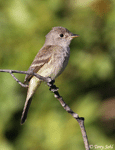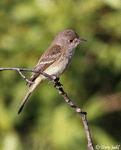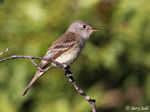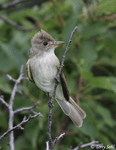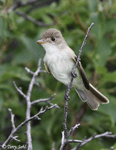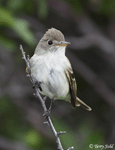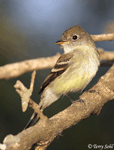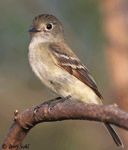| Length: 5.75 inches | Wingspan: 8.5 inches | Seasonality: Summer / Migrant |
| ID Keys: One of largest Empidonax. Dark brownish, broad straight-sided tail, broad bill. Extremely similar to Alder Flycatcher. | ||
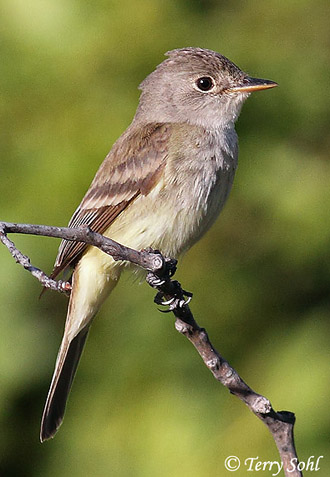 The Willow Flycatcher and
the Alder Flycatcher were considered one species, the "Traill's
Flycatcher", until the 1970's. Virtually identical in looks, they are
only safely distinguished from each other by their different voices. Their
ranges are quite different in summer, however, with the Alder Flycatcher found
primarily in Canada and Alaska, while most Willow Flycatchers are found in the
lower 48 states. In South Dakota, they are very similar in appearance to
other Empidonax Flycatchers. While Willow Flycatchers are summer breeding birds
in South Dakota, other Empidonax are primarily migrants, which typically limits
interspecies confusion to spring and fall migration. Given their similar visual
appearance, the most reliable way to identify Empidonax flycatchers is by song,
with Willow Flycatchers singing their distinctive "fitz-beww" song.
The Willow Flycatcher and
the Alder Flycatcher were considered one species, the "Traill's
Flycatcher", until the 1970's. Virtually identical in looks, they are
only safely distinguished from each other by their different voices. Their
ranges are quite different in summer, however, with the Alder Flycatcher found
primarily in Canada and Alaska, while most Willow Flycatchers are found in the
lower 48 states. In South Dakota, they are very similar in appearance to
other Empidonax Flycatchers. While Willow Flycatchers are summer breeding birds
in South Dakota, other Empidonax are primarily migrants, which typically limits
interspecies confusion to spring and fall migration. Given their similar visual
appearance, the most reliable way to identify Empidonax flycatchers is by song,
with Willow Flycatchers singing their distinctive "fitz-beww" song.
Habitat: Breeds in thickets and small trees, especially near water, but also along woodland edges and brushy fields.
Diet: Primarily insects and spiders. Will also occasionally eat berries, and possibly seeds.
Behavior: Forages in typical flycatcher fashion, observing from a perch and flying out to catch passing insects. In addition to catching insects in mid-air, they also glean insects from foliage while hovering.
Nesting: June and July. The nest of a Willow Flycatcher is a small cup, constructed of grasses and other bits of vegetation by the female. It is placed in a shrub or small tree, often quite low to the ground, and typically towards the outer edge of the shrub. She lays two to four eggs and incubates them for about two weeks.
Song: Willow Flycatcher song
Migration: Summers throughout much of the United States in varying numbers. Winters in South America.
Interactive eBird map: Click here to access an interactive eBird map of Willow Flycatcher sightings
Similar Species: Alder Flycatcher, Acadian Flycatcher
South Dakota Hotspot: Not a particularly difficult species to find in summer, as they are found along many riparian areas with scattered shrubs and trees. I always find several along the river at the Big Sioux Recreation Area during the summer months.
Conservation Status: Has declined locally where streamside habitat has been lost. A race that breeds along streams in the Southwest is endangered. However, while overall populations are likely in decline, they are still found over a wide geographic area, and are common in many parts of their range. The IUCN lists the Willow Flycatcher as a species of "least concern".
Further Information: 1) Patuxent Bird Identification InfoCenter, Willow Flycatcher
2) Audubon - Willow Flycatcher
3) WhatBird - Willow Flycatcher
Photo Information: July 29th, 2009 - Near Park City, Utah -- Terry Sohl
Additional Photos: Click on the image chips or text links below for additional, higher-resolution Willow Flycatcher photos.
| Click on the map below for a higher-resolution view |
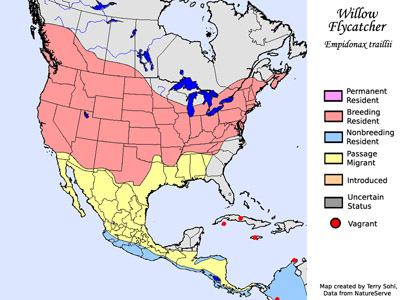 |
| South Dakota Status: Uncommon summer resident, more common in the eastern part of the state. |
Additional Willow Flycatcher Photos
Click for a higher-resolution version of these photos
